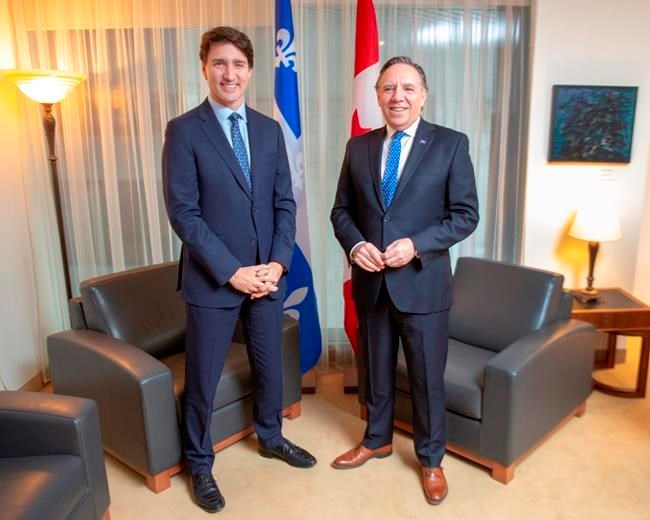Quebec Premier François Legault is asking Prime Minister Justin Trudeau to slow the influx of asylum seekers entering his province, which he said is nearing a "breaking point."
Legault made his request in an official letter to Trudeau sent Wednesday afternoon, a copy of which was obtained by The Canadian Press.
"We are very close to the breaking point due to the excessive number of asylum seekers arriving in Quebec month after month. The situation has become unsustainable," Legault wrote.
He said that in 2022, Quebec took in more asylum seekers than the rest of the country combined.
The closure of the unofficial Roxham Road crossing point south of Montreal in August 2023 "momentarily" slowed the flow, Legault said. "However, the arrivals have continued to increase at airports. The number of people arriving on a visitor visa and applying for asylum is also increasing significantly."
Nearly 60,000 new asylum seekers were registered in Quebec in the first 11 months of 2023, which has put "very significant pressure" on services, the premier writes.
"Asylum seekers have trouble finding a place to live, which contributes to accentuating the housing crisis," the letter said. "Many end up in homeless shelters, which are overflowing." He said organizations that help asylum seekers can't keep up with demand. Legault said the children of asylum seekers are also straining schools that already have a shortage of teachers and space.
The premier reminded Trudeau that asylum seekers who are waiting for work permits receive financial assistance from Quebec. Last October, 43,200 asylum seekers received $33 million in aid.
Legault expressed particular concern over Mexican nationals, whom he said represent a growing proportion of the asylum seekers coming to the province.
“The possibility of entering Canada from Mexico without a visa certainly explains part of the influx of asylum seekers,” he said.
“The airports, particularly in Toronto and Montreal, are becoming sieves and it is time to act,” he added.
In Iqaluit on Thursday afternoon, Trudeau responded to Legault's letter, saying he agrees "the government of Quebec and Quebecers themselves have been extremely generous" toward asylum seekers.
Trudeau said Intergovernmental Affairs Minister Dominic LeBlanc "is engaging directly with the province on this issue. And I can say that we will be there to share the burden and the responsibility to continue being a country that welcomes people around the world and integrates them successfully."
Legault's letter was not the first time the premier has written to Trudeau on the issue. Last February, he told the prime minister in another letter that Quebec's capacity to receive refugees had been greatly exceeded.
Legault is formally asking the prime minister to tighten its policies around granting visas. He's also seeking the "equitable" distribution of asylum seekers across Canada, possibly by busing them to other provinces. He wants Ottawa to reimburse Quebec the $470 million it spent on taking in asylum seekers in 2021 and 2022, and to do the same for subsequent years.
"Quebec is no longer in a position to welcome a disproportionate share of the asylum seekers entering Canada," he wrote in conclusion. "This is an urgent matter of the utmost importance."
On Tuesday, Trudeau reiterated his government's commitment to welcome 500,000 new permanent immigrants per year by 2025. However, he told the Chamber of Commerce of Metropolitan Montreal that his government wanted greater control over temporary immigration, such as international students and temporary workers, whom he said have a bigger impact on the housing crisis.
Trudeau invited higher education institutions and companies to find their own housing solutions for these temporary residents.
On Thursday, LeBlanc said Quebec has welcomed more than its share of asylum seekers and that he was taking the province's request for reimbursement seriously. But LeBlanc did not commit to transferring asylum seekers elsewhere in the country.
"We are committed to working with the government of Quebec to find solutions to the challenges posed by the significant number of asylum seekers that Quebec receives," he said in a statement posted to X, formerly Twitter.
"In addition, we are evaluating all possible measures to allow asylum seekers to travel to other provinces if they wish to do so."
The leader of the Parti Québécois was not impressed with Legault's letter. Paul St-Pierre Plamondon called it a “symbolic” gesture and challenged Legault to demand full immigration powers from Ottawa.
This report by The Canadian Press was first published Jan. 18, 2024.
Caroline Plante, The Canadian Press
Note to readers: This is a corrected story. A previous version misspelled the last name of Dominic LeBlanc.




